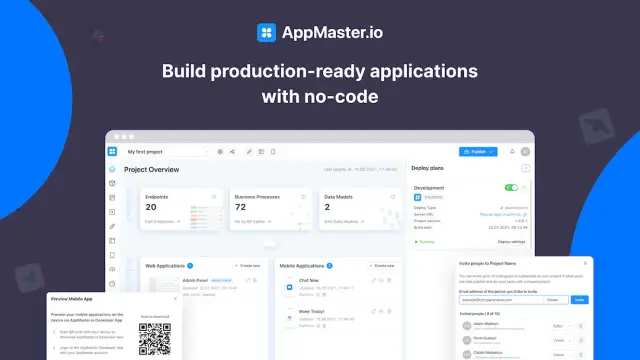The Benefits of Using PWAs for Your Business Apps
Explore the benefits of Progressive Web Apps (PWAs) for business apps. Discover how PWAs improve user engagement, cost-efficiency, and seamless experiences.

Understanding PWAs
Progressive Web Apps (PWAs) represent a paradigm shift in how we approach web development, blurring the lines between traditional web applications and native mobile apps. At its core, a PWA is a web-based application built using standard web technologies such as HTML, CSS, and JavaScript but enhanced with modern web capabilities to perform like a native app on any device or operating system.
The term "progressive" in PWAs refers to their ability to progressively enhance the user experience by taking advantage of the advanced features and functionalities available in modern browsers. This capability allows developers to provide a rich, app-like user experience directly from the web without requiring users to download and install applications from app stores.
Key Features of Progressive Web Apps
To be classified as a PWA, an application must align with specific core principles that ensure it delivers both the capabilities of web experiences and the performance of native applications:
- Responsive Design: PWAs are built to deliver a consistent user experience across different devices and screen sizes. This responsiveness ensures that whether a user is accessing the app from a mobile phone, tablet, or desktop, the application's layout automatically adjusts to provide optimal viewing and interaction.
- Offline Functionality: Through service workers, a type of web worker script, PWAs can cache resources and data to enable offline functionality. Users can continue interacting with the app without an internet connection, making PWAs incredibly reliable, especially in areas with poor network connectivity.
- Fast Loading Times: Performance is critical for user engagement, and PWAs use techniques like lazy loading and caching to ensure quick load times. This speed not only enhances the user experience but also contributes positively to search engine rankings.
- App-like User Experience: PWAs mimic the user interface and experience of native apps, featuring smooth animations, transitions, and a full-screen interface that eliminates the typical web browser controls for a more immersive experience.
- Secure Connections: Running over HTTPS is a requirement for PWAs. This ensures secure data transfers, protecting both the user's information and the site's infrastructure from malicious attacks.
- Discoverability and Installability: Unlike native apps, PWAs are discoverable through search engines, increasing their visibility. They can also be "installed" on users' home screens directly from the browser, offering the convenience of a native app without the need for an app store.
Progressive Web Apps have emerged as an optimal solution for businesses seeking to enhance their digital presence. They offer the dual benefits of broad reach through the web and a rich user experience akin to native applications. As a modern business, adopting PWAs can lead to increased engagement, reduced development costs, and expanded access, all while maintaining an app-like experience that consumers have come to expect.
Cost-Effectiveness of PWAs
In an era where businesses aim to maximize their return on investment, Progressive Web Apps (PWAs) emerge as a cost-effective solution for developing and maintaining business applications. By leveraging web technologies, PWAs offer a myriad of financial benefits that traditional app development methods often fail to deliver. Here's how PWAs prove to be a budget-savvy choice for businesses.
Unified Development Process
One of the most significant cost-saving aspects of PWAs is their unified development process. Unlike native applications, which require separate development for each platform — be it iOS, Android, or web — PWAs use a single codebase. This unification means businesses only need to design, develop, and maintain one version of their app, allowing for substantial savings in both time and resources. The reduction in parallel development efforts translates into lower overall costs and quicker time-to-market.
Lower Maintenance Costs
Another notable advantage of PWAs is their reduced maintenance requirements. Traditional native apps demand constant updates across multiple platforms whenever new features or bug fixes are introduced. PWAs, however, are updated like any other website. This single-update mechanism eliminates the need for separate deployment cycles, reduces labor costs, and simplifies version control, ultimately leading to decreased ongoing maintenance expenses.
No App Store Fees
By bypassing traditional app stores, PWAs also eliminate associated fees. Typically, deploying apps on platforms like the Apple App Store or Google Play Store incurs registration fees, revenue-sharing agreements, and potential listing costs. PWAs circumvent these charges because they are delivered via the web, allowing businesses to keep more revenue in their coffers and avoid the complexities and delays sometimes encountered when navigating app store ecosystems.
Increased Reach and Accessibility
PWAs are accessible from any device with a web browser, enabling businesses to reach a wider audience without investing in multiple platform-specific versions of their app. This broad accessibility encourages consumer engagement and enhances market penetration, which are both crucial aspects of achieving business growth. As a result, companies can realize increased revenue potential without incurring significant extra costs.
Simplified Development With AppMaster
AppMaster, a powerful no-code platform, supports the development of web applications, including PWAs. This tool enables businesses to build sophisticated apps with ease, devoid of the intricacies associated with traditional coding methods. By using AppMaster's drag-and-drop interface and automatic backend generation, companies can significantly reduce their development costs. AppMaster's ability to generate source code ensures that applications remain flexible and easy to update, contributing further to cost savings over time.

In conclusion, the cost-effectiveness of PWAs is undeniable. From initial development to ongoing maintenance and application deployment, PWAs present a financially advantageous model for businesses looking to optimize their software budgets while delivering high-quality, accessible applications to their users.
Enhanced User Engagement
Progressive Web Apps (PWAs) mark a paradigm shift in how businesses engage with users, combining the most compelling features of both web and native applications to create a seamless, dynamic experience. In today's competitive business realm, where customer attention is scarce and critical, PWAs stand out as an efficient means of enhancing user engagement.
Seamless User Experience
The crux of PWAs’ ability to bolster user engagement lies in their robust design, which ensures they perform like native apps. When users interact with a PWA, they experience fast load times, fluid animations, and smooth navigational elements. This level of performance eliminates common web app issues like lagging interfaces or slow responses, encouraging users to spend more time within the application.
Offline Access
One significant user engagement advantage PWAs provide is offline accessibility. Through the use of service workers, PWAs can cache data, allowing the application to function even when connectivity is compromised. Users can access the app without interruption, which can be particularly appealing for businesses in areas with inconsistent internet availability. This continuous accessibility ensures that businesses do not lose engagement simply due to technical barriers.
Push Notifications
PWAs have incorporated push notification capabilities, a feature originally exclusive to native applications. These notifications keep users informed about updates, offers, or reminders, driving continued interaction with the brand. Push notifications are an effective way to capture a user’s fleeting attention and potentially drive them back to the application, thereby maintaining a brand presence even when the user is not actively engaged with the app.
Interactivity and User-Centric Features
PWAs offer a high degree of interactivity, enabling businesses to deploy a plethora of user-centric features. From customizable interfaces to instant payment solutions, PWAs allow businesses to adapt their platform to better meet user preferences, enhancing the overall customer experience. The ability to tailor these interactions makes users feel valued and understood, increasing their likelihood of returning.
Cohesive Multi-Channel Experience
Another important aspect of a PWA is its ability to deliver a cohesive experience across multiple channels. Users expect consistency when they interact with a brand online, whether through a computer, tablet, or smartphone. With PWAs, businesses can ensure the same quality and performance is maintained across these devices, creating a recognizably unified user experience. This consistency helps in building trust and loyalty among users, influencing long-term engagement.
By leveraging the numerous capabilities intrinsic to Progressive Web Apps, businesses can foster deeper user engagement, encourage higher user retention, and ultimately drive more meaningful conversions. Platforms like AppMaster make it easy for businesses to implement and expand upon these features, integrating the user-first focus that PWAs offer. Overall, the adoption of PWAs can significantly enrich the engagement strategies of companies by offering users a smoother, more reliable, and highly interactive experience.
Cross-Platform Compatibility
The realm of application development is frequently challenged by the need to ensure a solid cross-platform presence. In this diverse ecosystem where various devices and operating systems rule the digital roost, ensuring seamless compatibility can be quite a hurdle. Progressive Web Apps (PWAs) have emerged as a remarkable solution to this challenge, offering a single codebase that effortlessly adapts to multiple platforms.

When developing apps, businesses typically face the dilemma of whether to build separate native applications for iOS and Android, each with its own set of requirements and standards. This traditional approach often leads to prolonged development timelines and increased maintenance expenses. Fortunately, PWAs simplify this process, empowering businesses to disseminate their apps across a wide array of platforms without duplicating efforts.
One of the significant advantages of PWAs lies in their inherent capacity to function with any standards-compliant browser. Leveraging core technologies such as HTML, CSS, and JavaScript, PWAs run seamlessly on any device, be it a smartphone, tablet, or desktop. This blend of web technologies equips businesses with the means to create responsive applications that automatically adjust to various screen sizes and resolutions, delivering a consistent user experience no matter the device.
Moreover, PWAs eliminate the necessity for cumbersome downloads and installations. Users simply access PWAs through their web browsers, receiving updates in real-time and instantly benefiting from the latest features. This streamlined process is particularly beneficial for businesses seeking to engage a broad audience, as it removes barriers to entry and simplifies user interaction.
Another notable aspect of PWAs is their ability to function like native apps while maintaining the portrayal of a web application. Features such as offline access and push notifications are seamlessly integrated, fostering a native-like experience that users appreciate. This not only boosts user engagement but also makes it easier for businesses to manage and unify their app strategy across various platforms.
By embracing PWAs, businesses can unlock streamlined cross-platform compatibility, enabling them to reach a wider audience efficiently and cost-effectively. With a single dynamic app serving all platforms, companies can reduce overheads and better allocate resources towards enhancing core functionalities and improving the user experience.
Improved Performance and Reliability
One of the standout advantages of Progressive Web Apps (PWAs) is their ability to deliver impressive performance and reliability, providing users with a seamless experience akin to native apps. This results from several key elements that PWAs bring to the table, each enhancing the overall functionality and user engagement of a web-based application.
Speed and Efficiency
PWAs are designed to load with remarkable speed, dramatically reducing the wait time for users. By leveraging service workers, PWAs can cache resources efficiently, ensuring critical content is available almost instantaneously during subsequent visits. This speed is not merely a luxury; it is a crucial factor in ensuring user retention. Research indicates that even a one-second delay in page load can reduce conversions by a significant margin, highlighting the importance of an app's loading time.
Offline Functionality
A standout feature of PWAs is their ability to function offline or in areas with low network connectivity. Through the clever use of service workers, PWAs store necessary data for offline use, enabling users to continue interacting with the app without an active internet connection. This aspect enhances user experience significantly, particularly in regions where internet access is intermittent or unreliable.
Reliable Performance
Reliability is integral to the user experience, and PWAs are built to offer robust consistency. Users can trust that their interactions with the app won't be disrupted by connectivity issues, as PWAs are capable of managing network conditions intelligently. This reliability fosters trust and ensures users can accomplish tasks without interruption, which is vital for business-critical applications.
Interactivity and User Engagement
PWA technology supports dynamic content updates, ensuring users receive the most current information without the need for manual refreshes. This dynamic nature imitates that of native apps, offering a more engaging and responsive platform for users to enjoy. Users familiar with app-like interactivity in native applications will find PWAs provide a comparable experience, aligning familiar gestures and interface expectations.
Businesses employing PWAs can expect to see improvements in user satisfaction and retention, driven by these performance and reliability gains. This advantage can lead to higher conversion rates and lower bounce rates, essential metrics in any business's growth strategy. PWAs bring the necessary competitive edge in mobile user experience without the extensive costs associated with separate native app development.
SEO Benefits of PWAs
Progressive Web Apps (PWAs) have become a critical component for businesses looking to enhance their online presence, not just through app functionality, but by boosting their search engine optimization (SEO) as well. Let's delve into how PWAs contribute to SEO improvements and why they're an appealing choice for businesses looking to increase visibility and engagement online.
Faster Load Times
One of the key advantages of PWAs is their ability to load at lightning speed compared to traditional web apps. PWAs employ techniques like service workers that cache assets and components of the application. This method enables PWAs to load almost instantaneously when users revisit the site. Faster load times are a critical factor for SEO as they directly influence a website's performance metrics. Search engines like Google prioritize sites with quick loading times, leading to higher rankings in search results.
Mobile-Friendliness
Mobile-friendliness is an essential aspect of SEO optimization, and PWAs are designed with a mobile-first approach. Their responsive design ensures that they function seamlessly across various devices, including smartphones and tablets. Given that a growing number of users access the web via mobile devices, search engines reward mobile-friendly sites by ranking them higher. This makes PWAs an advantageous choice for businesses that are targeting users across multiple devices.
Improved User Experience
PWAs offer an enhanced user experience by combining the best attributes of native and web applications. Features such as ease of use, fast interaction, and offline capabilities keep users engaged. This improved user experience often results in longer session durations and reduced bounce rates, which are positive signals for search algorithms. Search engines interpret these engagement metrics as indicators of quality content and user satisfaction, boosting the app's SEO.
Secure Connections
Security is another critical element affecting SEO, and PWAs excel in this area by serving content over HTTPS. This secure protocol prevents unauthorized access and data tampering, crucial for gaining trust from users and search engines alike. Secure connections have become a significant ranking factor, and employing HTTPS is now a standard practice that aligns with the best SEO strategies.
Increased User Engagement and Retention
PWAs leverage features like push notifications to boost user engagement. By keeping users informed and engaged with timely updates, businesses can cultivate a loyal user base. Active user engagement and a higher retention rate are considered when search engines evaluate site relevance and usefulness, thus positively impacting SEO efforts. In essence, adopting Progressive Web Apps for your business doesn't just translate into a superior app experience for users — it also opens avenues for improved SEO, leading to greater visibility and success in the digital space. Platforms like AppMaster facilitate the seamless creation of PWAs, empowering businesses to elevate their presence with an optimal, responsive, and engaging solution that meets modern SEO standards.
Practical Use Cases for Business Apps
Progressive Web Apps (PWAs) offer businesses a versatile and cost-effective solution that combines the best of web and mobile applications. As such, they have been increasingly adopted across various industries to drive customer engagement and operational efficiency. In this section, we explore some compelling use cases for implementing PWAs in business apps.
E-commerce Platforms
E-commerce businesses are particularly well-suited to leverage the capabilities of PWAs. By creating a PWA, retailers can deliver an app-like experience to their customers without the friction of app store downloads. PWAs enhance the user experience with features such as offline browsing, push notifications for sales and promotions, and fast-loading interfaces that closely resemble native apps. These benefits translate into higher conversion rates and improved customer retention as users enjoy seamless access to products and services. An excellent example is Alibaba, which saw a significant increase in conversion rates by adopting PWAs.

Content Delivery and Media Streaming
For businesses in content delivery and media streaming, PWAs provide an optimal way to engage audiences. By using PWAs, companies such as Forbes have created faster, more reliable content delivery systems, which improve user satisfaction and repeat visits. Furthermore, PWAs enable media streaming companies to deliver high-quality video and audio content even under unreliable network conditions. This enhances the user experience and ensures continuous engagement with the platform without interruptions.
Travel and Hospitality
In the travel and hospitality sectors, PWAs offer customers the convenience of accessing crucial trip information at their fingertips. Whether it's making a booking, checking into a hotel, or viewing itinerary updates, PWAs provide a unified experience. Companies such as Trivago have utilized PWAs to improve platform performance, leading to higher engagement from travelers who appreciate the seamless accessibility and offline capabilities.
Banking and Finance
In the financial industry, PWAs empower customers with real-time access to their financial data and services without the need to navigate through a mobile app store. Banks can use PWAs to provide new levels of service, enabling clients to manage accounts, pay bills, and transfer funds quickly and securely. Since PWAs perform well under varying network conditions, they ensure consistent access to financial services, which is critical for maintaining customer trust and satisfaction.
Internal Business Tools
Businesses looking to improve internal operations can also benefit from PWAs by developing internal tools that enhance productivity and communication. These applications can help manage tasks, facilitate collaboration, and streamline processes across various departments. PWAs prove advantageous as updates can be deployed more efficiently without the need for employees to update individual apps manually, ensuring everyone in the organization is using the latest version of the tool.
How AppMaster Supports PWA Development
Recognizing the diverse needs of industries, AppMaster delivers robust support for businesses interested in developing PWAs. Leveraging its no-code platform, AppMaster empowers companies to create fully interactive web applications swiftly and efficiently, without the traditional constraints of software development. With AppMaster, businesses can build progressive web applications that enhance user engagement and operational efficiency. This no-code approach does not require extensive technical expertise, making it accessible to companies of any size and from any industry.
How AppMaster Supports PWA Development
In the world of Progressive Web Apps (PWAs), businesses are constantly on the lookout for efficient development tools that can help them create high-performing and cost-effective applications. AppMaster steps in as an invaluable ally, providing the resources and capabilities necessary to take PWA development to the next level.
Leveraging No-Code Capabilities
AppMaster is a no-code platform that empowers users to design and develop PWAs without the need for extensive coding knowledge. With its visual interface, creators can utilize drag-and-drop functionality to build seamless user experiences, making it accessible even to those with minimal technical expertise. This effectively broadens the opportunity for diverse teams to contribute to the development process, unlocking innovation and creativity.
Create Interactive Web Applications
The platform specializes in the creation of fully interactive web applications, which aligns with the essential characteristics of PWAs. Users can design user interfaces, set up server-side logic, and bind various components to create a dynamic application. This interactivity is key to offering a superior PWA experience where users feel more engaged without sacrificing performance.
Robust Business Process Designer
At the core of AppMaster's PWA development offering is its Business Process (BP) Designer. This robust feature allows businesses to visually map out complex logic and functionality within their applications. As a result, developers can easily implement critical PWA features such as service workers, caching strategies, and push notifications, ensuring the application remains functional offline and maintains optimal performance.
Integrated Deployment and Testing
AppMaster simplifies the deployment and testing phases by integrating these processes directly within its platform. When a PWA is ready to go live, the platform automates the deployment, testing, and packing processes, compressing the time needed to go from development to production. This seamless integration saves time and resources, allowing businesses to bring their products to market faster.
Scalability and Flexibility
The platform supports scalable and flexible applications thanks to its use of stateless backend design and compatibility with Go for backend services. This ensures that business applications are equipped to handle significant user loads, making them ideal for enterprise and high-demand environments. PWAs developed with AppMaster can thus meet the scaling requirements of businesses as they grow and evolve.
Seamless Integration with Existing Systems
Integration capabilities are another significant advantage. With AppMaster, businesses can easily connect their PWAs with other systems, such as databases, CRMs, and other enterprise-level software. This interoperability ensures that the applications can serve as integral components of a company’s broader software ecosystem.
By leveraging the many strengths of AppMaster, businesses can produce high-quality PWAs that are efficient, engaging, and aligned with modern user expectations. From idea conception to deployment, it provides the tools needed to realize innovative web applications that seamlessly blend the world of web and native functionalities.
FAQ
A Progressive Web App (PWA) is a type of application software delivered through the web, designed to work on any platform that uses a standards-compliant browser.
PWAs provide a more engaging user experience by combining the best features of web and native apps, including offline access, push notifications, and fast load times.
PWAs are cost-effective as they eliminate the need for separate apps for iOS, Android, and web. A single PWA can serve all platforms, reducing development and maintenance costs.
Yes, PWAs can function offline or on low-quality networks, thanks to service workers that pre-cache information, ensuring the app works smoothly without an internet connection.
Yes, PWAs improve SEO by ensuring fast load times, mobile-friendliness, and higher engagement rates — factors that positively influence search engine rankings.
Prominent companies like Twitter, Starbucks, and Pinterest have successfully implemented PWAs to improve performance and user engagement.
PWAs use web technologies like HTML, CSS, and JavaScript, allowing them to work seamlessly across different devices and operating systems with a single codebase.
AppMaster provides extensive support for PWA development, enabling businesses to create fully interactive web apps with ease, bolstered by its no-code platform.
Virtually any industry, from e-commerce and media to banking and travel, can benefit from adopting PWAs to enhance customer experience and streamline operations.
While native apps offer certain advantages, PWAs provide faster initial load times and the ability to function like native apps with key features like offline access and push notifications.





